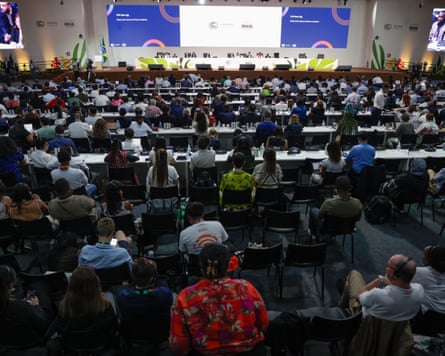Beyond the negative headlines, some truly good things came out of Cop30
November 27, 2025
Some commentators have called Cop30 a failure. An attempt to insert plans for a route to the phaseout of fossil fuels into the legal text was stymied, consideration of how to improve countries’ emissions-cutting plans was put off till next year, and although developing countries got the tripling of finance for adaptation that they were seeking, it will not be delivered in full until 2035 – and will come out of already promised funds.
Look beyond the headlines, however, and the Cop achieved a great deal more. Take the outcome on fossil fuels – it seems absurd, but until 2023 three decades of annual climate summits had failed to address fossil fuels directly.
More on the positives to come out of this year’s climate conference, after this week’s most important reads.
Essential reads
-
UK can create 5,400 jobs if it stops plastic waste exports, report finds
-
Zombie fires: how Arctic wildfires that come back to life are ravaging forests
-
There’s a catastrophic black hole in our climate data – and it’s a gift to deniers | George Monbiot
In focus

Belém, a city of 2.5 million people, sits about 100 miles (161km) below the equator, near the mouth of the Amazon river and in the midst of rainforest, which creates its own weather. Most afternoons, torrential downpours soak the city, and frequently throughout the fortnight-long climate talks that ended on Saturday, the thunder roared outside the conference centre, shaking the ground beneath, while lightning flashed on those fortunate enough to catch a glimpse of the outside world.
All this was lost on the thousands of negotiators from 194 countries who filled the windowless rooms. Occasionally, they had to pause over the microphone, as the deafening drumming of rain on the plastic roof drowned out their words. Mostly, however, their attention was all within.
It is true that a discussion of a path to the end of the fossil fuel era did not make it into the final legal text. However, Cop30 president André Corrêa do Lago noted that Brazil – whose president Luiz Inácio Lula da Silva spoke several times in favour of a phaseout – did have a “plan B”, which is now in full swing. That is a presidential initiative to consult governments, energy experts, civil society and scientists, and report back at Cop31 on how a plan for the “transition away from fossil fuels” may work.
It is possible, at Cops, to get too hung up on what is legally binding and what is not. Before the Paris agreement was signed in 2015, many people were angry that although the main part of the treaty – limiting temperatures to 1.5C above preindustrial levels – was legally binding, the means of doing so – national plans on emissions, called nationally determined contributions or NDCs – were in a separate, nonbinding annexe.
Over the course of the 19 Cops I have now reported from, I calculate that I have sat through days, possibly even weeks, of earnest back -and-forth discussions on what is legally binding. My takeaway from that is: get over it. The finer points of legal shading turn out to matter a lot less than countries’ political priorities.
The fact that NDCs are not legally binding turned out not to be a problem. The real issue is that they are so far inadequate to keep to the 1.5C limit and must be strengthened.
Many countries are wary of a “top-down” approach, by which global commitments are imposed on them, and prefer the “bottom-up” model that NDCs represent, which they feel allows them to retain some sovereignty over their decisions. (Many developing countries endured decades of being told what to do by organisations such as the International Monetary Fund, which frequently imposed on them unpalatable policies such as privatising national assets or cutting public services in return for bailouts. It left a bitter taste.)
The transition away from fossil fuels should be seen in this light. A nonbinding process that allows countries to decide their own pathways, policies and timetables toward the eventual phaseout of oil, gas and coal has far more chance of succeeding than anything that is seen as an outside imposition.
(There is also, within the baggy UN framework convention on climate change, ample opportunity for any voluntary roadmap to be brought within the legally binding fold in future. A future Cop, in Turkey next year, Ethiopia in 2027, and perhaps India in 2028, could opt to “recognise”, “welcome”, “acknowledge” or even – the strongest formulation – “adopt” the roadmap idea, giving it legal standing to please the purists.)
Detractors dismiss nonbinding initiatives as “coalitions of the willing” but, ultimately, climate progress comes from such coalitions – nobody can force countries to follow the Paris agreement, or other commitments, if their government decides not to. Just look at the US.
What matters in the climate crisis is not the legal status of words agreed over night-long sessions in windowless conference rooms. What will save us is real-world action. If enough countries display their intent to move away from fossil fuels, money will follow. Today, global investment in renewables is twice that of fossil fuels; a quarter of all new vehicles sold worldwide are electric; and half of the power-generating capacity of China and India is low-carbon.
Look outside, hear the thunder, feel the rain: in the real world, change is happening.
Read more:
Search
RECENT PRESS RELEASES
Related Post




